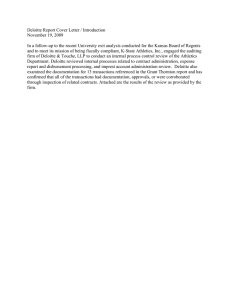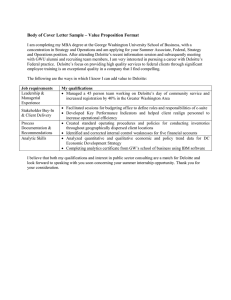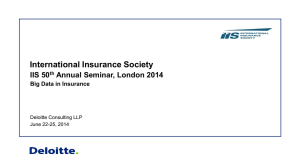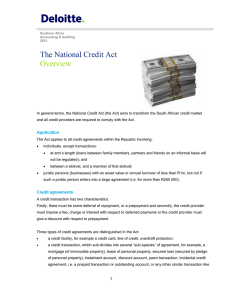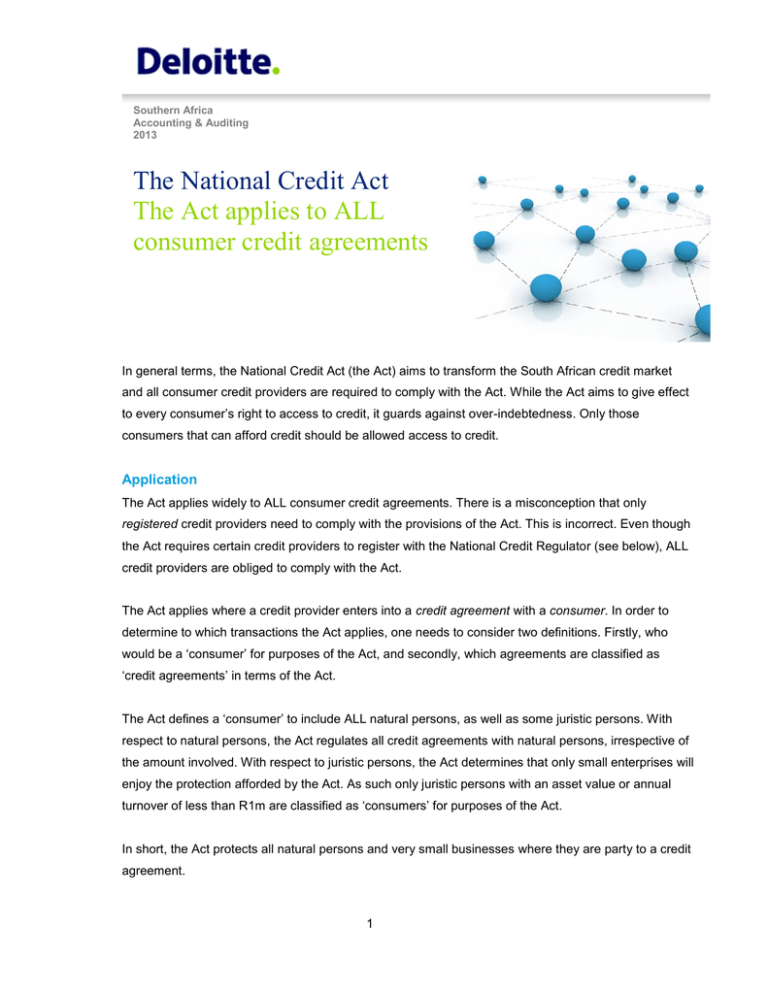
Southern Africa
Accounting & Auditing
2013
The National Credit Act
The Act applies to ALL
consumer credit agreements
In general terms, the National Credit Act (the Act) aims to transform the South African credit market
and all consumer credit providers are required to comply with the Act. While the Act aims to give effect
to every consumer’s right to access to credit, it guards against over-indebtedness. Only those
consumers that can afford credit should be allowed access to credit.
Application
The Act applies widely to ALL consumer credit agreements. There is a misconception that only
registered credit providers need to comply with the provisions of the Act. This is incorrect. Even though
the Act requires certain credit providers to register with the National Credit Regulator (see below), ALL
credit providers are obliged to comply with the Act.
The Act applies where a credit provider enters into a credit agreement with a consumer. In order to
determine to which transactions the Act applies, one needs to consider two definitions. Firstly, who
would be a ‘consumer’ for purposes of the Act, and secondly, which agreements are classified as
‘credit agreements’ in terms of the Act.
The Act defines a ‘consumer’ to include ALL natural persons, as well as some juristic persons. With
respect to natural persons, the Act regulates all credit agreements with natural persons, irrespective of
the amount involved. With respect to juristic persons, the Act determines that only small enterprises will
enjoy the protection afforded by the Act. As such only juristic persons with an asset value or annual
turnover of less than R1m are classified as ‘consumers’ for purposes of the Act.
In short, the Act protects all natural persons and very small businesses where they are party to a credit
agreement.
1
The Act applies to all credit agreements within the Republic involving:
individuals, except transactions:
at arm’s length (loans between family members, partners and friends on an informal basis
will not be regulated); and
between a stokvel, and a member of that stokvel;
juristic persons (businesses) with an asset value or annual turnover of less than R1m, but not if
such a juristic person enters into a large agreement (i.e. for more than R250 000).
Note: Where the juristic person enters into a credit agreement for more than R250 000, the Act does
not apply. Thus, the Act protects very small businesses (asset value or annual turnover of less than
R1m), but where the business can afford to enter into a large agreement (more than R250 000), no
protection is provided – the logic seems to be that the State is willing to protect very small businesses,
but where they enter into a large agreement, they should be able to afford lawyers to enforce their own
rights.
In instances where credit is provided to a juristic person with an asset value or annual turnover of more
than R1m, the Act does not apply.
Credit agreement
A credit agreement has two main characteristics: Firstly, there must be some deferral of repayment, or
a prepayment and secondly, the credit provider must impose a fee, charge or interest with respect to
deferred payments or the credit provider must give a discount with respect to prepayment.
Three types of credit agreements are distinguished in the Act:
a credit facility, for example a credit card, line of credit, overdraft protection;
a credit transaction, which sub-divides into several “sub-species” of agreement, for example, a
mortgage (of immovable property), lease of personal property, secured loan (secured by pledge
of personal property), instalment account, discount account, pawn transaction, incidental credit
agreement, i.e. a prepaid transaction or outstanding account, or any other similar transaction like
an unsecured loan; and
a credit guarantee.
Where a company provides staff loans, it must comply with the Act. This is so because a staff loan
constitutes a credit agreement with a consumer (natural person).
Registration as a credit provider
The Act requires certain credit providers to register with the National Credit Regulator. This includes
credit providers that either have more than 100 credit agreements on their book, or where the total
value of all credit agreements exceeds R500 000. Registered credit providers are obliged to submit
prescribed information to the Regulator for statistical purposes.
2
Note: All credit providers MUST comply with the Act – even those credit providers that are not
required to register.
Enforcement of the Act
The National Credit Regulator is established as the primary administrative regulator under the Act, to
carry out education, research, policy development, registration of industry participants, investigation of
serious complaints, and to ensure enforcement of the Act.
The National Consumer Tribunal will adjudicate on a wide variety of applications, and conduct hearings
into complaints under the Act.
Compliance with the Act
Where credit is provided to a consumer, the credit provider must comply with all relevant provisions of
the Act. The Act is complex and requires compliance with a host of requirements. In short, the credit
provider must:
provide the consumer with a quotation on the cost of the credit (i.e. the initiation fee, monthly
administration fee and the interest rate)
Determine whether or not the consumer can afford the credit (so-called reckless credit check)
Provide the consumer with a written agreement containing all prescribed provisions
Only charge the consumer the fees and interest that are not more than the prescribed maximum
Calculate the interest in terms of the rules of the Act
Provide the consumer with regular statements of account
Comply with the relevant provisions of the Act when it enforces a credit agreement (in the case of
default.
Assurance engagement
The Act requires the auditor or accounting officer of every credit provider to submit an Assurance
Engagement report to the National Credit Regulator. The auditor or accounting officer needs to confirm
that they relied on evidence obtained during the course of the audit of the financial statements of the
credit provider in order to report non-compliance with the Act and Regulations identified during the
audit, where such non-compliance may materially affect the annual financial statements of the credit
provider.
Note: This obligation to submit an Assurance Engagement report to the National Credit Regulator
applies to the auditor or accounting officer of every credit provider – whether or not they are required
to register, and irrespective of the number of credit agreements they are party to. Thus, where a
company provides no credit to its customers, but provides staff loans, it needs to comply with the
Act, and its auditor needs to submit the Assurance Engagement report to the Regulator.
3
Queries: Dr Johan Erasmus – jerasmus@deloitte.co.za
Home | Security | Legal | Privacy
Deloitte refers to one or more of Deloitte Touche Tohmatsu Limited, a UK private company limited by guarantee, and
its network of member firms, each of which is a legally separate and independent entity. Please see
www.deloitte.com/about for a detailed description of the legal structure of Deloitte Touche Tohmatsu Limited and its
member firms.
Deloitte provides audit, tax, consulting and financial advisory services to public and private clients spanning multiple
industries. With a globally connected network of member firms in more than 150 countries, Deloitte brings world-class
capabilities and high-quality service to clients, delivering the insights they need to address their most complex
business challenges. Deloitte has in the region of 200 000 professionals, all committed to becoming the standard of
excellence.
This communication is for internal distribution and use only among personnel of Deloitte Touche Tohmatsu Limited,
its member firms and their related entities (collectively, the “Deloitte Network”). None of the Deloitte Network shall be
responsible for any loss whatsoever sustained by any person who relies on this communication.
© 2013 Deloitte & Touche. All rights reserved. Member of Deloitte Touche Tohmatsu Limited
4


